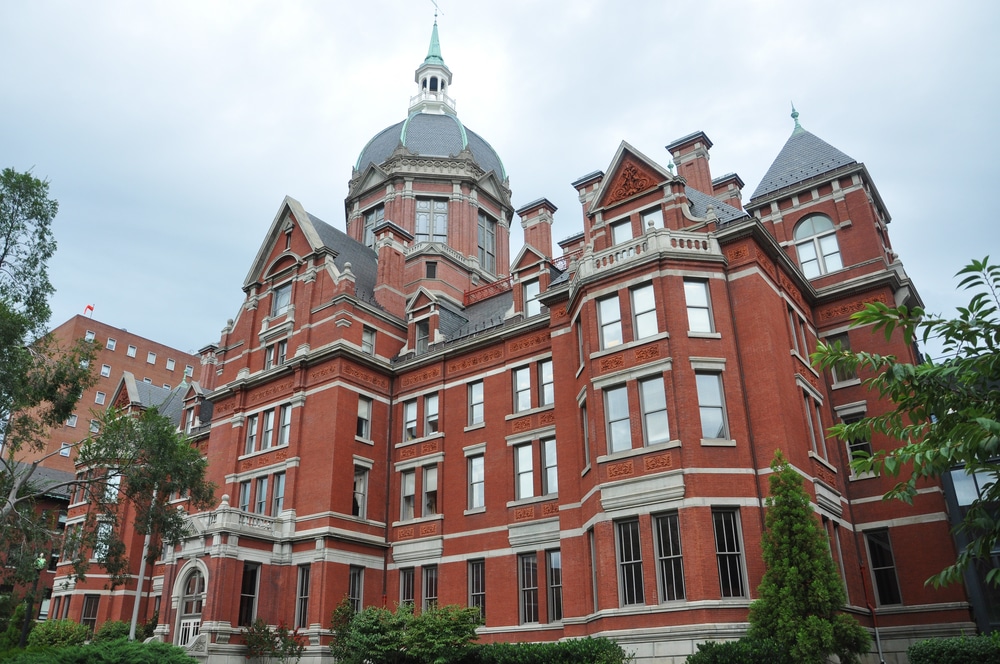A Closer Look at Johns Hopkins Medical School
Johns Hopkins Medical School, formally known as The Johns Hopkins University School of Medicine, is a globally recognized institution renowned for its contributions to medical education, research, and clinical care. Established in 1893 in Baltimore, Maryland, this prestigious institution has been at the forefront of medical advancements and has fostered a culture of innovation, intellectual curiosity, and patient-centered care.
Over the years, Johns Hopkins Med School has not only cultivated some of the brightest minds in the medical field but has also made groundbreaking strides in various areas of medical research. Its commitment to the biopsychosocial model of patient care and the integration of research into the medical curriculum revolutionized medical education across the United States and the world.
Today, Johns Hopkins continues to hold a prominent position in medicine. Its importance is underlined by its consistently high ranking in national and international surveys, its extensive contributions to medical literature, and its ability to consistently produce leaders and pioneers in diverse medical specialties.
As a leading light in the field, John Hopkins Medical School continues to shape the future of medicine through its relentless pursuit of knowledge, dedication to the highest standards of treating patients, and enduring commitment to training a new generation of doctors and researchers.
John Hopkins Med School History
The John Hopkins Med School, one of the most esteemed medical schools worldwide, was founded in 1893, thanks to the philanthropy of Johns Hopkins, a Baltimore merchant who left a significant legacy in his will to create a hospital and a university. His vision was to create a medical institution that would provide high-quality patient care and serve as a center for medical education and research.
The early years of Johns Hopkins Medical School were marked by several innovative strides, including being one of the first med schools to allow women, a testament to its forward-thinking ideals. Over the years, the medical school has been home to numerous breakthroughs in medical science, including the development of renal dialysis, the discovery of restriction enzymes leading to the advent of genetic engineering, and the first ‘blue baby’ operation, which paved the way for modern cardiac surgery.
The contributions of several notable figures also mark the institution’s history. Dr. William Osler, known as one of the founding professors, revolutionized medical education by insisting that students learn from direct contact with patients. Another towering figure, Dr. Alfred Blalock, Vivien Thomas, a skilled surgical technician, and Dr. Helen Taussig, a pediatric cardiologist, developed a surgical procedure to treat cyanotic heart disease in children, popularly known as ‘blue baby syndrome.’
These are some examples of the many luminaries associated with the Johns Hopkins Medical School, each leaving an deep mark on the history of medicine. The institution’s legacy is one of continual innovation, transformative discoveries, and a commitment to educating medical professionals who make a lasting impact in their fields.
Johns Hopkins University School of Medicine Academics
The Johns Hopkins University School of Medicine offers a robust and challenging curriculum designed to equip students with the proper knowledge, skills, and attitudes necessary to excel in the dynamic field of medicine. The curriculum is divided into two primary phases: the pre-clerkship phase, which focuses on core biomedical and public health sciences, and the clerkship phase, which immerses students in clinical practice.
The Genes to Society curriculum, introduced in 2009, underscores the school’s commitment to integrating the basic sciences with clinical medicine, focusing on the genetic, environmental, and societal factors that influence disease. Throughout the curriculum, students can select from various electives, allowing them to tailor their education to their specific interests and career goals.
Beyond the classroom, Johns Hopkins Medical School offers many research opportunities in various fields, such as molecular medicine, neuroscience, immunology, and health equity, to name just a few. These opportunities enable students to contribute to cutting-edge research, learn from world-renowned faculty, and develop a critical understanding of the research process.
Special programs and initiatives at the school include the Medical Scientist Training Program, a dual MD-PhD degree for those interested in an academic medicine career , and the Scholarly Concentrations program, which encourages students to explore a range of interdisciplinary topics.
These diverse academic opportunities underscore the school’s dedication to fostering a comprehensive and multidimensional medical education that serves both the individual interests of students and the broader needs of society.
Johns Hopkins Medical School admission requirements and process
Gaining admission to the Johns Hopkins Medical School is a competitive process that requires thorough preparation and dedication from prospective students. The school seeks candidates who have demonstrated academic excellence, a strong motivation for a medical career, and displayed personal characteristics such as empathy, resilience, and leadership.
Regarding academic prerequisites, applicants must complete courses in biology, chemistry, and physics. It is strongly recommended that applicants also have a humanities or social sciences background. All applicants must take part of the Medical College Admission Test (MCAT), and scores are expected to be competitive with the national average.
The application process involves submitting a primary application through the American Medical College Application Service (AMCAS), including academic records, MCAT scores, letters of recommendation, and personal statements. Those selected after the primary application review are invited to submit a secondary application, including additional essays.
This is followed by an invitation for an interview, which is a critical aspect of the selection process. Regarding admission rates and statistics, Johns Hopkins Medical School is among the most selective nationwide, with an acceptance rate often falling below 5%. Each incoming class typically includes approximately 120 students chosen from thousands of applicants.
While these figures underscore the competitiveness of the admissions process, they also reflect the school’s commitment to selecting a diverse and dynamic group of students who will contribute meaningfully to the field of medicine.
Johns Hopkins Alumni and Post-Graduation
Upon graduation, students from the Johns Hopkins University School of Medicine are presented with many opportunities to further their training and specialize in their chosen field. The university’s medical center offers a comprehensive range of internships and residency programs across various specialties, including internal medicine, pediatrics, surgery, and radiology.
Johns Hopkins’ reputation for clinical excellence and its expansive network across the healthcare industry also aid graduates in securing competitive residencies and fellowships at other prestigious institutions across the country and around the globe.
In terms of career paths, Johns Hopkins Medical School alumni have gone on to distinguish themselves in many roles in the medical field, ranging from clinical practice and medical research to healthcare administration and global health policy. The school counts numerous influential figures in medicine among its alumni, including Nobel laureates, pioneering surgeons, and esteemed medical researchers.
Furthermore, the school’s post-graduation success rates are impressive, with most graduates matching into their desired residency programs each year. Many alumni also publish in prestigious journals and secure competitive research grants, highlighting the school’s enduring commitment to advancing medical knowledge and patient care.
A Johns Hopkins University School of Medicine degree opens the door to many opportunities, enabling graduates to contribute significantly to medicine and beyond.
Johns Hopkins Contributions and Impact on Medicine
Johns Hopkins University School of Medicine, has been at the forefront of numerous significant research initiatives and medical discoveries that have dramatically advanced the field of medicine. This esteemed institution was instrumental in developing renal dialysis, discovering restriction enzymes that opened the door to genetic engineering, and the groundbreaking ‘blue baby’ operation, revolutionizing cardiac surgery.
Additionally, Johns Hopkins was the site of discovery of heparin, a critical anticoagulant, and the development of CPR. The institution’s research and discoveries have heavily influenced medical policies and practices in the United States and globally. The concept of medical residency, now a cornerstone of medical education worldwide, was pioneered at Johns Hopkins.
The school’s innovative ‘Genes to Society’ curriculum has also influenced how medical education is approached, emphasizing the need for a deeper and comprehensive understanding of the patient’s genetic makeup, lifestyle, and societal factors. Johns Hopkins’ contributions to medicine have garnered widespread recognition and numerous awards.
Johns Hopkins Medical School consistently ranks among the top medical schools in the world, and its faculty and alumni have received some of the highest accolades in the field, including the Nobel Prize in Physiology or Medicine. Moreover, the institution’s numerous research papers are frequently cited by other researchers worldwide, underlining its work’s global impact and influence.
In summary, Johns Hopkins University School of Medicine has made. It continues to make far-reaching contributions to medicine, shaping clinical practices, influencing medical policies, and pushing the boundaries of medical knowledge.
Future Vision and Direction of John Hopkins University
As a pioneering institution in medicine, the Johns Hopkins University School of Medicine continually looks towards the future, seeking to explore new frontiers in medical science, education, and patient care. Currently, the school is engaged in several groundbreaking research projects spanning various disciplines, from investigating the potential of immunotherapy in cancer treatment to exploring the genetic underpinnings of neurodegenerative diseases.
Looking ahead, the school plans to further strengthen its research capabilities by investing in state-of-the-art facilities and technologies and recruiting top-tier researchers worldwide. In terms of medical education, Johns Hopkins remains committed to nurturing a new generation of medical professionals who are technically proficient and possess the compassion, empathy, and ethical grounding necessary to provide exceptional patient care.
The school aims to further innovate its curriculum to ensure it remains consistently relevant and responsive to the needs of the healthcare sector. Additionally, Johns Hopkins is focusing on expanding its strategic partnerships and collaborations domestically and internationally.
These collaborations with other academic institutions, industry partners, and governmental and non-governmental organizations enhance the school’s research capabilities, broaden its educational offerings, and extend its impact on global health. As Johns Hopkins Medical School looks to the future, it remains steadfast in its mission to improve the community’s and the world’s health by setting a high standard of excellence in medical education, research, and clinical care.
Now that you have an idea about Johns Hopkins University, your college admissions into that university should be next on your mind. To ensure that you get into Johns Hopkins University, you can get help with AdmissionSight. With ten years of experience with college admission experts, AdmissionSight can help you get into Johns Hopkins University. You can talk to our experts today to get an initial consultation.








































